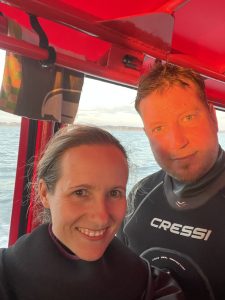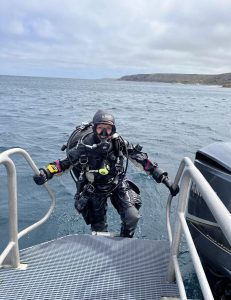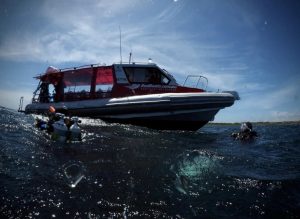Seemingly Small Mistake Becomes Massive Risk: Lessons Learned
It’s not every day that you realise that you could have died from making what seemed like a very simple decision and mistake.
But this is exactly what happened to me on New Years Eve just gone.
And there are some valuable takeaways that you can apply, so you don’t find yourself in danger for no good reason.
*Disclaimer; this is a diving story, but you don’t have to go scuba diving to apply the lesson in your own life!

On New Years Eve and Mike and I were booked onto a night time scuba diving charter (no the lesson is not to stay on land, not go scuba diving, avoid night diving).
It was a hot night and wearing my dry suit, with a layer of merino wool base layer plus an extra insulated jump suit to keep me warm at 30m under water was like a personal sauna on the surface.
In order to safely travel on the boat (especially outside of Port Phillip heads), you need to keep the suit zipped up, or otherwise wear a life jacket (and there was no way I was adding an extra layer of anything).
To avoid fainting from overheating, I quickly undid the suit once we were in a safe location to cool down momentarily.
The tide was changing direction, which sometimes doesn’t follow the weather report and we found ourselves getting our gear on to jump in very quickly.
I ran through all my regular safety checks, that I could inflate my vest, breathe through my regulators and all the other normal steps.
Jumping into the water, within 3 seconds I felt water coming inside my suit, I had a leak.
The key thing to know here, is I was wearing a dry suit (not a wet suit) and am meant to stay dry (and warm).
This was the first key moment, when I should have made a different decision to the one made.

FAILURE POINT 1 – Ignoring the Problem
I ignored it.
Basically, what went through my mind was, how bad could it possibly be?
I’m wet now, so I might get a bit cold over the next 45 minutes, but it will be fine.
There was also a strong hint of stubbornness, of not wanting to resurface and possibly miss out on the dive.
So I kept going.
FAILURE POINT 2 – I didn’t tell anyone

We use hand signals under the water to communicate with our dive buddies and indicated that everything was okay.
At that point, it was, I was just wet.
Over the next few minutes, I noticed that I was having to kick a bit harder to keep up with the crew.
FAILURE POINT 3 – I still didn’t tell anyone
So it was a little tiring, but there was no reason to worry anyone else with what was going on, in fact, I wasn’t sure how I was going to tell them, so I just indicated I was okay again.
By this stage, we were slowly ascending from 30m to 20m over a few minutes, while kicking against a current, while checking out the underwater wreck of the ex-HMAS Canberra battleship.
We were looking inside metal, in the dark, using our torches to see a couple of metres at most at any time.
FAILURE POINT 4 – Still indicating I was okay
Once again, we checked in and all indicated we were fine (me included), even though I was getting tired and finding it hard to keep up with them.
Then I realised it was really hard to ascend.
I was having to literally swim upwards, while inflating my vest in order to go up.
Under normal circumstances, as you start to go up, you have to let air out of your vest as the air expands under pressure (and you can come up too quickly and get the bends).
By this stage, I knew I was in a bit of trouble.
It was dark, getting colder, my muscles were fatiguing and I was starting to panic.
I couldn’t keep up and my buddies were progressively getting further ahead.
Suddenly, I realised I was getting low on air and needed to start going to the surface (now).

But they weren’t looking at me, they had their heads in a hole on the side of a shipwreck (seriously who could blame them).
We were 18m from the surface.
I tried signalling with my torch.
There was only a few minutes of air up my sleeve and I was rapidly sucking it down and I was going to need more than normal to get to the surface.
I was about to deploy a safety marker to the surface (which was going to use more air), when the others saw I was signalling that I was low on air.
It’s fair to say that they were very confused, as we should have had enough for at least another 30 minutes, maybe more.
But they knew what to do.
Although they didn’t know what was happening or why.
We safely all slowly ascended to our designated safety stop at 6m under, where we stop and rest for 3 minutes, allowing for nitrogen build up in our body to dissipate and to reduce our risk of getting the bends.
If needed, there was the option to breathe off their tanks if required.
On the surface, I was exhausted and the boat came to pick us up quickly.
Then I encountered my next hurdle, how to get on the boat.
Not only was I fatiguing and on the verge of full body cramps, I couldn’t bend my arms or legs due to the amount of water that my suit had filled up with.
In fact, it was somewhere between 30-50L (that’s an extra 30-50kg).
I was stuck on the ladder, climbing up and got stuck and couldn’t move.
There was no energy to ask for help.
The boat captain realised what was happening, helped pull me up, then rolled me over, unzipped my suit and hung me upside down while the water poured out all over the boat.
Finally, I was feeling completely spent, but safe and started laughing uncontrollably.

WHAT SIMILAR MISTAKES YOU COULD BE MAKING
Have you ever…..?
- Looked at your phone while driving and not caused an accident
- Worn earphones crossing the street and not seen a car that you could have stepped out in front of
- Drunk too much alcohol, fallen over and wondered how you didn’t hurt yourself
Or do you…..?
- Eat too much take away and know one day it may become a problem
- Never get around to exercise, even though you know it isn’t good for you
- Spend too much time on technology and are quite possibly addicted to it
These are all examples of small mistakes, sometimes it is a once off that can have a big potential consequence, or a small but repeated issue that can become a danger over time.
When you pay attention to your own habits, behaviours and actions, you can learn massively from mistakes that we make, some could even happen on a daily basis.
LESSONS LEARNED
There are many lessons to be taken away from putting yourself in a dangerous situation, but here are a few of mine.
1. Communication is key
Tell someone that something is wrong, that way you can come up with a plan about what to do next together.
2. Don’t let stubbornness get in the way
Being stubborn can just make the problem get bigger and go on for longer than it needs to.
3. Let go of expectations
Just because we want something to happen in a particular way, at a particular time, it doesn’t always work out that way.
4. Ask for help
You don’t have to figure it all out by yourself or go it alone, even when it is your fault.
5. Reflect and grow
Take the time to really think about what is happening and why.
Really push yourself to dig deep on what is going on.
Write it down, including how you feel about it, not just the situation.
Then identify any potential struggles and things that could get in the way of you making a different decision in the future. Acknowledge the benefits and really understand why you want to change your behaviour.
This will allow for growth and lasting change.
Feel free to apply these lessons to your own scenarios.
If you have a story you would like to share with me, or an important lesson of your own, we’d love to hear from you.

